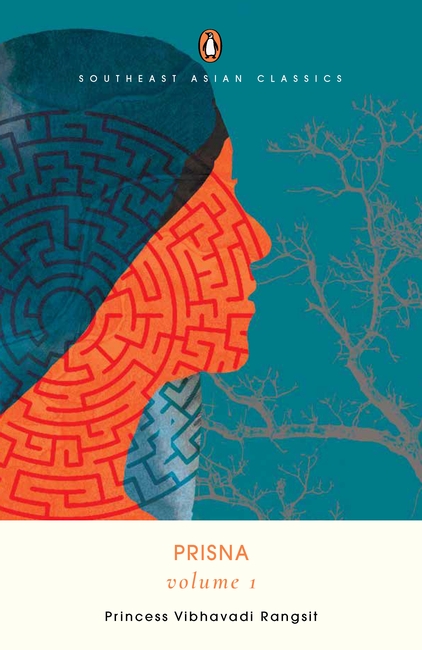
© 2020 Penguin SEA

Prisna takes place in 1938 in Phra Nakhon, Thailand, during a time when men and women were not equals. Marriage for women meant security, not love. Prissana is the youngest daughter among four girls and was the only one raised in America by their uncle. She is outgoing, cheerful, and pretty, but at the same time, she is also headstrong, intelligent, and opinionated. She returns to Thailand after living in America for 12 years and is once again reunited with her family. Prissana, whose name means ‘mystery, a puzzle/riddle,’ causes quite a stir in Thailand with her open, American behavior and refreshing beauty. She develops a dislike toward Taan Chai Puthpreecha, whom she has never met, because everyone puts him on a pedestal.
Over the course of time, both end up having to reevaluate their presumptions of each other as they get to know one another better.
Published: Dec/2020
EISBN:
ISBN: 9789814914154
Length: 264 Pages
Imprint: Audiobook
Published:
ISBN:
Prisna takes place in 1938 in Phra Nakhon, Thailand, during a time when men and women were not equals. Marriage for women meant security, not love. Prissana is the youngest daughter among four girls and was the only one raised in America by their uncle. She is outgoing, cheerful, and pretty, but at the same time, she is also headstrong, intelligent, and opinionated. She returns to Thailand after living in America for 12 years and is once again reunited with her family. Prissana, whose name means ‘mystery, a puzzle/riddle,’ causes quite a stir in Thailand with her open, American behavior and refreshing beauty. She develops a dislike toward Taan Chai Puthpreecha, whom she has never met, because everyone puts him on a pedestal.
Over the course of time, both end up having to reevaluate their presumptions of each other as they get to know one another better.
Her Royal Highness Princess Vibhavadi Rangsit (née Her Serene Highness Princess Vibhavadi Rajani) was born on 20th November 1920. The daughter of His Highness Prince (Krom Muen) Bidyalongkorn and Her Serene Highness Princess Bornbimolban Rajani (née Voravarn), she was educated at Mater Dei School, Bangkok. After graduating from the Finishing Course, she worked as a secretary for her father, one of the greatest poets of the Ratanakosin era, who wrote under the pseudonym 'Nor. Mor. Sor.' Princess Vibhavadi inherited her father's gift for writing and displayed her abilities at the early age of 14 when she began to write a novel for children. She used the pen-name V. na Pramuanmarg which became well known amongst Thai literary circles. Her famous first novel 'Prisna' was written when she was just eighteen years old and was subsequently followed by two sequels and many other novels, as well as historical novels.
Princess Vibhavadi married His Serene Highness Prince Piyarangsit Rangsit, the eldest son of His Royal Highness Prince Rangsit Prayurasakdi, Prince of Jainad, on 6th May 1946. They were the only couple ever to have been married by His Majesty King Ananda Mahidol (Rama VIII).
Besides a busy home life bringing up two daughters Mom Rajawongse Vibhanand and Mom Rajawongse Priyanandana Rangsit, and a full writing career, she embarked on another course which was to occupy her to the end of her days: that of serving Their Majesties King Bhumibol Adulyadej (Rama IX) and Queen Sirikit, the Queen Mother. She began to accompany Them when They toured the country in 1957 and was appointed Lady-in-Waiting to Her Majesty Queen Sirikit when Their Majesties went on Their first State Visit in 1960. Altogether, Princess Vibhavadi accompanied the King and Queen abroad on seven occasions to a total of 25 countries.
The last ten years of her life were dedicated to rural development in Southern Thailand under the direction and sponsorship of His Majesty King Rama IX. Her involvement began when the King asked her to go to a remote and backward area called Pra Saeng in Surat Thani. From that initial visit in 1967, she was committed to developing the hitherto neglected areas and to improving the standard of living of the villagers. Sponsored by the King, she led a medical team on countless missions to distribute medical supplies, schooling equipment, blankets and other necessities to the needy villagers. Undaunted by the hardship of travel, Princess Vibhavadi led the medical team to all the neglected and inaccessible parts of the southern provinces. Wherever she went, the grievances of the villagers were noted down and subsequently rectified by the authorities. In this manner, rural development followed Princess Vibhavadi's trodden path: roads were built, new health centres and schools established, electricity reached new destinations etc. Upon the wishes of Her Majesty Queen Sirikit, she also promoted local handicrafts so that the women could earn extra income.
Princess Vibhavadi was not concerned about her personal safety and often went to visit the troops and Border Patrol Policemen in troubled areas where insurgency flared. Thus, on the morning of 16th February 1977, on what was to be a routine mission to visit the villagers and to boost the morale of the troops in Wieng Sra district of Surat Thani, she boarded an Army helicopter. On the way to her destination, she heard on the radio that two Border Patrol Policemen had been wounded by a landmine explosion. As she wanted the wounded men to receive medical aid as soon as possible, she told the pilot to change the flight route so that the helicopter could go to pick them up and take them to a hospital. As it was flying low over Baan Nua Klong in Surat Thani, the helicopter was ambushed from the ground by Communist terrorists. The burst of machine gun fire not only crippled the helicopter, but fatally wounded the Princess. She died an hour later.
Prior to her cremation on 4th April, 1977, 'in recognition of her services to the country and the people', His Majesty King Bhumibol Adulyadej (Rama IX) conferred upon her the rank of Pra Ong Chao (Her Royal Highness) and bestowed the highest decoration of the Most Illustrious Order of the House of Chakri.
It has now been 43 years since that tragic day which stunned the nation. She was particularly mourned in the Southern Provinces where a 15-day mourning period was declared. To this day, her death anniversary, the 16th of February, is known as Vibhavadi Day in Surat Thani where civil and religious ceremonies are held in her honour simultaneously at the five monuments dedicated to her.